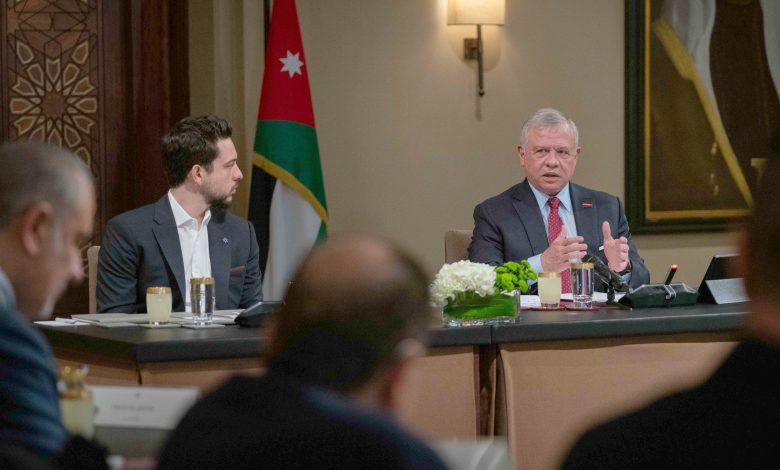
Jordan Daily – His Majesty King Abdullah on Monday reaffirmed that Jordan is a strong and stable nation that grows stronger in times of crisis.
During a meeting at Al Husseiniya Palace attended by His Royal Highness Crown Prince Al Hussein bin Abdullah II, King Abdullah urged representatives of the private sector to contribute in providing ideas and solutions to support economic sectors that were affected by the current conditions, especially tourism.
His Majesty said Jordan has experience in dealing with crises and is able to continue building its economy during difficult conditions, noting that the Kingdom has the support of Arab and friendly countries because it is a strong nation.
The King stressed the need to maintain progress in jumpstarting the national economy, calling for finding an economic hedging mechanism to safeguard against the current conditions in the region.
Jordan’s economic strength is a strength for all Jordanians and their brothers and sisters in Palestine, said His Majesty, adding that a strong Jordan is able to continue to support the Palestinians.
The King reaffirmed that Jordan continues all its efforts to reach a lasting ceasefire in Gaza, and to facilitate the delivery of humanitarian aid to the Strip and the West Bank to alleviate the impact of the humanitarian catastrophe there.
His Majesty stressed the importance of strengthening the partnership and coordination between the public and the private sectors to face economic challenges, as well as maintain growth of national investments, and attract more foreign investments.
The King affirmed the importance of moving forward with economic and administrative modernisation, despite the challenges.
Additionally, His Majesty reaffirmed the importance of the Aqaba-Amman Water Desalination and Conveyance Project and its positive impact on water security, calling on the private sector to play a part in its implementation.
The King listened to suggestions by attendees representing the private sector, who commended the Central Bank of Jordan’s (CBJ) policy in maintaining financial and fiscal stability.
They said Jordan’s economic sectors are strong and able to grow, calling for finding means to safeguard them, especially tourism, against the impact of regional challenges, and to turn challenges into opportunities, as well as facilitate licensing processes for projects and financing methods for sectors affected by crises.
Attendees stressed the importance of maintaining coordination with the government to take pre-emptive measures for affected sectors, through short, medium, and long-term plans.
For his part, Prime Minister Bisher Khasawneh said the overall performance of the national economy is reassuring with the completion of over 80 per cent of the goals of the economic modernisation plan, within the timeframe for this year.
He added that the government finished the sixth review with the International Monetary Fund, noting that the draft state budget law that will be sent to Parliament will include the highest capital investment volume.
The prime minister said the government is studying supporting sectors affected by the current conditions, especially tourism.
CBJ Governor Adel Al Sharkas highlighted the stability of Jordan’s monetary and fiscal outlook, adding that the economy is able to withstand challenges, and that the strength of the dinar protects the national economy.
Sharkas said the trade balance deficit is forecast to narrow, adding that Jordanian exports and remittances are expected to increase in the upcoming period.
He added that Jordan’s commitment to fiscal and monetary reforms has contributed to the stability of the national economy; therefore, Jordan registered the lowest inflation rates worldwide.
A number of ministers and officials attended the meeting.

